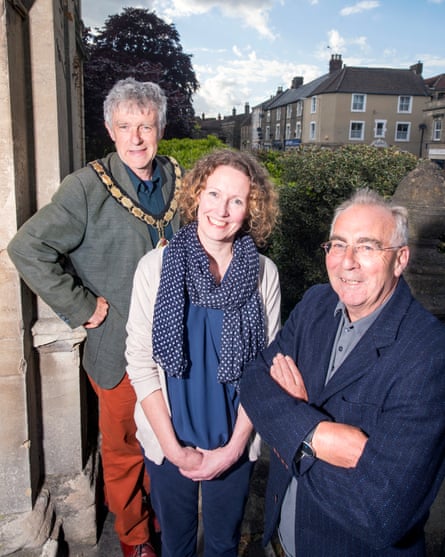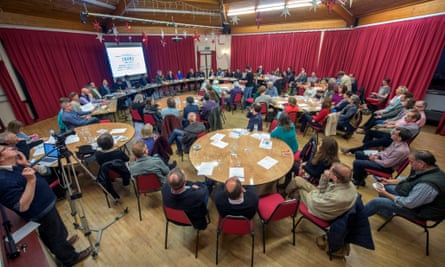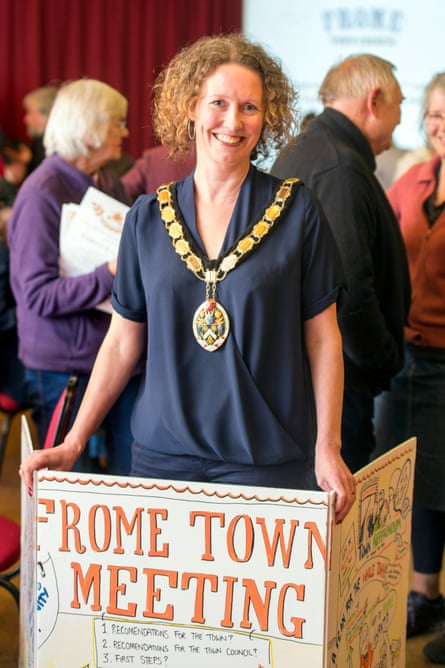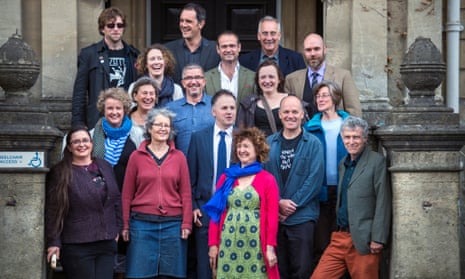At this year’s Glastonbury, while some people get excited about the Foo Fighters and others loll around the Healing Field, one of the events in Billy Bragg’s politics-and-music Left Field tent will be devoted to a discussion of “Radical Movements”. The organisers have booked speakers from Greece’s governing party, Syriza, insurgent Spanish rebels Podemos and Scottish leftwing collective Radical Independence, all of whom will presumably give it some about the horrors of neoliberalism and the nitty-gritty of popular revolt. And then there will be the representative from Frome.
Somewhat incongruously, the speaker from the Somerset market town will be there to explain an idea known as “flatpack democracy”, and a small-scale revolution that has turned local politics there, and elsewhere, on its head.
The basic aim seems both simple and benign: “Taking political power at a local level, then using it to enable people to have a greater say in the decisions that affect their lives.” But the results have been explosive: the routing of Lib Dems and Conservatives (and, of late, a solitary Ukipper) from Frome’s town council, and the arrival in power of a coalition of self-styled independents, united by the belief that democracy needs a drastic revival.
On 7 May, after four years in power, the Independents for Frome (or IfF) group took all 17 seats on Frome’s town council, with vote-shares as high as 70%, and support from people who cast their other votes for the main political parties. Moreover, the IfF idea seems to be spreading, as people add their voices to a quiet rebellion that is materialising in some very unlikely places – from small commuter towns in Bedfordshire to the political home of George Osborne. There are two key elements to this very English revolt: a quest to revive the often moribund town and parish authorities long squashed by county, borough and district councils, and give them a new energy and purpose; and in the places where party politics has dominated even this lowly tier of government, the shoving aside of the big parties in pursuit of new ways of doing things.

I have lived in Frome since 2009, and have closely followed the IfF story. The town has a population of 25,000, and an increasing reputation for creative thinking – though its somewhat overheated coverage (the Times recently placed it in the UK’s top 30 “most fashionable places to live”) rather belies the reality of everyday life. For a start, our beard count is still very low, and a Shoreditch-style cereal cafe would not last five minutes. More importantly, Frome is a post-industrial town, long viewed rather sniffily in more upmarket parts of Somerset. Unemployment might be low, but so are average wages – and there are many of the same social problems that make the news in more well-known places.
Politically speaking, many of the town’s residents have some of the self-organising philosophy that seems to have drifted down from Bristol, 25 miles to the north. Despite a newly elected Tory MP who represents a constituency that extends deep into the surrounding countryside, Frome’s collective politics have a greenish hue – though it seems to defy orthodox political categories, and be more comfortable blazing its own trail.
The chief theorist of flatpack democracy (the term is a reference to the idea’s basic DIY ethos) is 57-year-old Peter Macfadyen, who has lived in Frome for nearly 30 years, and has spent much of his adult life working for disability charities, as well as founding an eco-friendly local undertakers. A graduate of the south-west’s hippie counterculture who brims with can-do enthusiasm, he was one of the people who co-founded IfF at the tail-end of 2010, having been repulsed by what he had seen of the existing town council.
His main source of irritation was the extent to which the party politicians running it seemed walled in behind bureaucracy and protocol. Decisive proof came, he tells me, when he approached the town’s ruling Liberal Democrats on behalf of Frome’s branch of the Transition Towns movement, which seeks to respond to climate change on a local level. “I went to them and said, ‘What’s your green policy?’. And they said: ‘The park.’ I said, ‘Climate change, peak oil – what about all these things that actually matter?’ They said: ‘No, sorry – it’s the park.’ That and a few hanging baskets.”
While Macfadyen seethed, a parallel conversation was taking shape among a group of people including 64-year-old Mel Usher, a native of Sunderland who had settled in Frome after a long career working in and around local government. He and some of his friends were just as frustrated with the inertia of the town’s politics, but also excited by the new coalition government’s localism bill. “Previously, what town and parish councils could do was very nebulous,” he says. “What the localism bill said was, ‘You can do anything, as long as it’s legal.’ And that’s what started to drive us along – we thought we could really use it constructively.”
At an initial public meeting in the upstairs room of a town-centre pub, a collective resolution was made to put up candidates for all of the town council’s seats. “You can’t change things if you only put up a few people,” says Macfadyen. “It has to be total revolution or nothing: that was our stance.” The somewhat oxymoronic idea was to form a group of independents – in the sense that political diversity was held to be a strength, and there would be no whipping on council votes. Instead, the new group would be held together by a codified way of working that acknowledged the inevitability of disagreement, and a sense of purpose that would differentiate it from the kind of old-school independent councillors – “independent ratepayers”, they often used to call themselves – who too often turn out to be complacent timeservers.
At the local elections of May 2011, IfF candidates won 10 seats on the town council – including four previously held by the Lib Dems and three by the Tories, and their group thereby took control. Usher became the council leader after serving a term as the town’s mayor, Macfadyen was this week announced as his successor.

Over the last four years, despite regular tussles with a Tory-run district council still getting used to the arrival of these new upstarts, the IfF group has been very busy. On top of the annual £1m it gets from local council tax, £250,000 – donated by a local philanthropist impressed by the flatpack democracy idea – has been invested in the town via a specially formed community interest company. In the face of opposition from local Conservatives convinced that austerity had to apply even at the most local level, the council has also borrowed around £750,000 to invest in buildings and land, and to boost its regeneration work. Green spaces have been spruced up and game-changing help has been given to the local credit union. The council is involved in a new renewable energy cooperative, and has put money into the setting up of a new “share shop” – as far as anyone knows, the first one in the UK, from which people can borrow everything from drills and gardening tools to children’s toys.
Macfadyen talks about all this with real passion, but he thinks the IfF group’s biggest achievements are less palpable. He enthuses about the fact that all its recent candidates – including serving councillors – were selected by an independent panel, a measure clearly intended to kibosh any possibility of cronyism. And he sets great store by the way the town council’s meetings are organised. “They’re infinitely friendlier now, more open. We get crowds sometimes. There are other town councils where the clerk walks in first, and the members stand, the mayor comes in behind, and they then say a prayer. The public have to write in beforehand, saying they want to speak. And it’s all just lost in some sort of Victorian past. It’s just insane. And of course, it means that if you know all the rules, you’re in control. That’s the problem.”
Last year, Macfadyen decided to pour the IfF story into a 100-page booklet called Flatpack Democracy, subtitled “A DIY guide to creating independent politics”. When the-then local government secretary Eric Pickles visited Frome in February 2015, he pronounced it the “home of localism”, bought a copy, and after having lunch with Macfadyen, insisted that he sign it.
The booklet has so far sold close to 1,000 copies, and Macfadyen is regularly in touch with similar groups of independents in such towns as Liskeard in Cornwall, Newbury in Berkshire, Bradford-on-Avon in Wiltshire, and Wells, Wedmore and Shepton Mallet, all in Somerset. Most notably, on 7 May, people who had directly followed the example set out in his text took control of two councils in very different parts of the country.
One was in Arlesey, a settlement of 5,000 people in Bedfordshire – just under 40 minutes by train from London – whose town council is now run by the Independents for Arlsey group, after they won 14 of its 15 seats. Its founders were alerted to the flatpack democracy idea via Facebook, and resolved to shake up the politics of a town that had got used to uncontested elections and a council run by old-school independents. One of the prime movers was 64-year-old Chris Gravett, who says that whereas the town’s ancien régime was “dysfunctional”, he and his colleagues are now set on starting everything from scratch. “We’ve followed the core principles in the Flatpack Democracy book pretty closely,” he says. “We took a lot of advice from it. And I must say: the results were beyond our wildest expectations.”
In Buckfastleigh in Devon (population: 3,326), the Buckfastleigh Independents group have followed a similar path. “This isn’t an affluent community,” says the town’s new deputy mayor, Pam Barrett. “It’s a working-class town that’s been suffering from a real loss of services.” Fired up by the possibilities of localism and their experience of fighting – successfully – to keep open a library and swimming pool, she and other residents resolved to stand for town council seats that had not been contested for “20 or more years”. One of the catalysts, she says, was a box of 10 copies of the Flatpack Democracy booklet, which was brought in by one of her colleagues. “It was articulating what we were already thinking,” she says, “and it helped us take a lot of shortcuts.” On 7 May, they took nine of 12 seats, and started running the show.
In other places, highly motivated groups of independents have achieved similar feats without any knowledge of the flatpack democracy idea, suggesting that what has happened in Frome and elsewhere might be part of a general political wave. A good example is Alderley Edge in Cheshire, a very affluent village that sits at one end of the Tatton constituency, held since 2001 by George Osborne. Until 7 May, its town council was solidly Tory, but dissent was brewing – a result of such controversies as the council’s plan to replace long-established allotments with a car park.
On election day, the Conservatives lost all nine of the parish council’s seats to a new group called Alderley Edge First, which also took the village’s one seat on Cheshire East council. Though the people responsible were not aware of developments in the West Country, their thinking is much the same: as one newly elected councillor, Mike Dudley-Jones, tells me, “our basic mantra is that there is no place for mainstream party politics at this level”.
Back in Frome, the day after I meet McFadyen and Usher, I pitch up at the town council’s first meeting since the recent IfF landslide (commemorated in that morning’s Frome Times with the headline “Welcome to the People’s Republic of Frome!”). The 17 freshly elected councillors sit at a long table, à la The Last Supper, in wildly diverse dress, ranging from suits and ties to a Led Zeppelin T-shirt. The meeting opens with questions from the floor. At one point, the town clerk delivers a brass-tacks PowerPoint presentation about the structures of English local government and how the town council works – intended not just for the 50 or so members of the public who have turned up, but some of the new councillors.

On the agenda is the appointment of the town’s latest mayor, who serves a one-year term: this time, it’s the newly elected Kate Bielby, 47. A freelance copywriter who describes her politics as “getting more left by the minute”, she says she was drawn to IfF by two things: the sense that “there was none of that old chattering and bickering – they were achieving things you could see in the town”, and a local initiative called Engaging Women, organised by a high-ranking IfF councillor, which played a role in persuading at least two other women to stand for the council. “It’s very exciting,” Bielby tells me. “That day, when we won 17 seats, was amazing, just this feeling of, ‘Wow – there’s stuff we can do.’”
Amid the IfF group’s jubilation, one key question springs to mind. Now that they hold all the seats on the town council, there have been local murmurings about whether the absence of any official opposition will turn out to be a good thing. But throw this point at the town council’s prime movers and the answers that come back voice two contrasting arguments: a belief in IfF’s democratic ideals, and critique of the arrogant kind of rule perpetrated by a system in which whatever the opposition says, if one party has the numbers, it can freely impose its will on everybody else.
“This is actually much healthier,” insists Macfadyen. “This group of 17 people has within it a range of views. If there’d been a majority – even of one – for one of the main parties, I’d be worried. Because, as we’re now seeing at Westminster, they’d go out and say, ‘Sod the lot of you, we’re going to do what we want.’ You know – 12 seats more than everyone else and they’re bringing back fox hunting. We couldn’t do that, because we have such a wide range of people.”
“Most of the traditional parties draw their candidates from a very limited pool,” says Mel Usher, “whereas we put an advert in the paper and said, ‘Come along.’ All you needed was a telephone number and an email address, and one side of A4 paper saying what you wanted to do for Frome. They were then selected by an independent group of people. And they were genuinely independent.”
The outgoing leader of the People’s Republic of Frome cracks a smile. “The only time I tried to interfere, they told me to fuck off,” he says. “Which was good.”

Comments (…)
Sign in or create your Guardian account to join the discussion